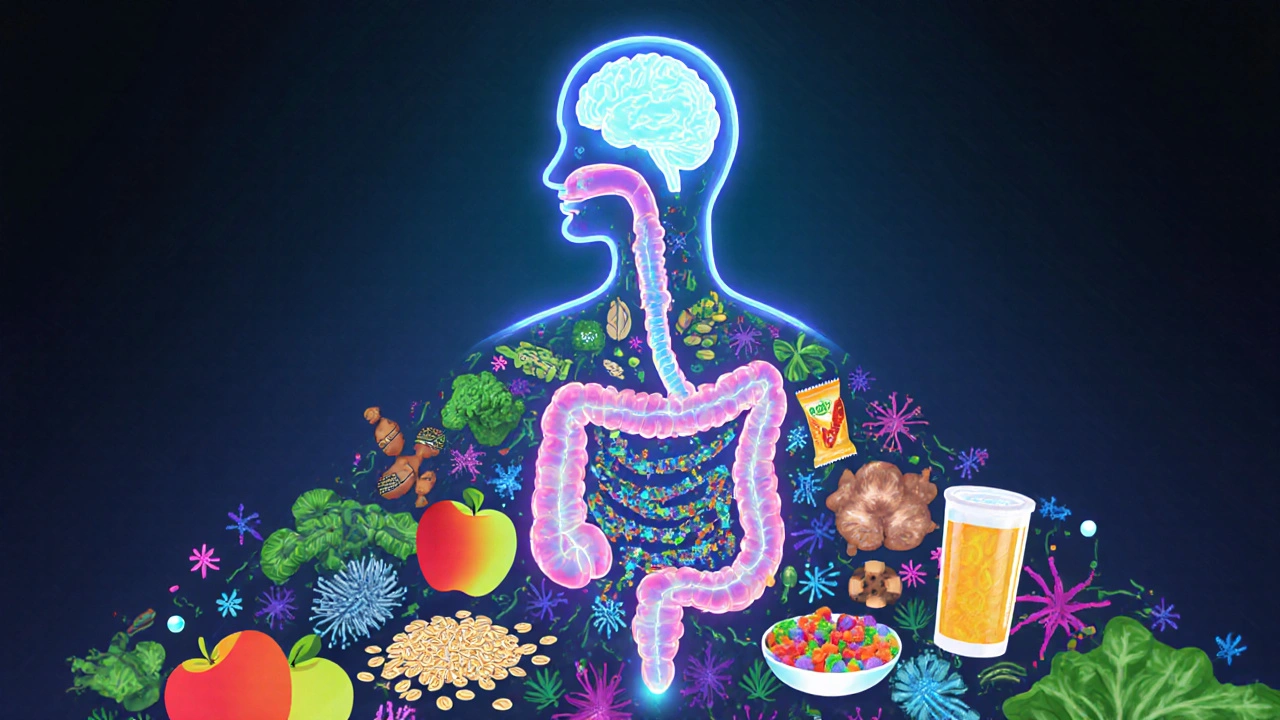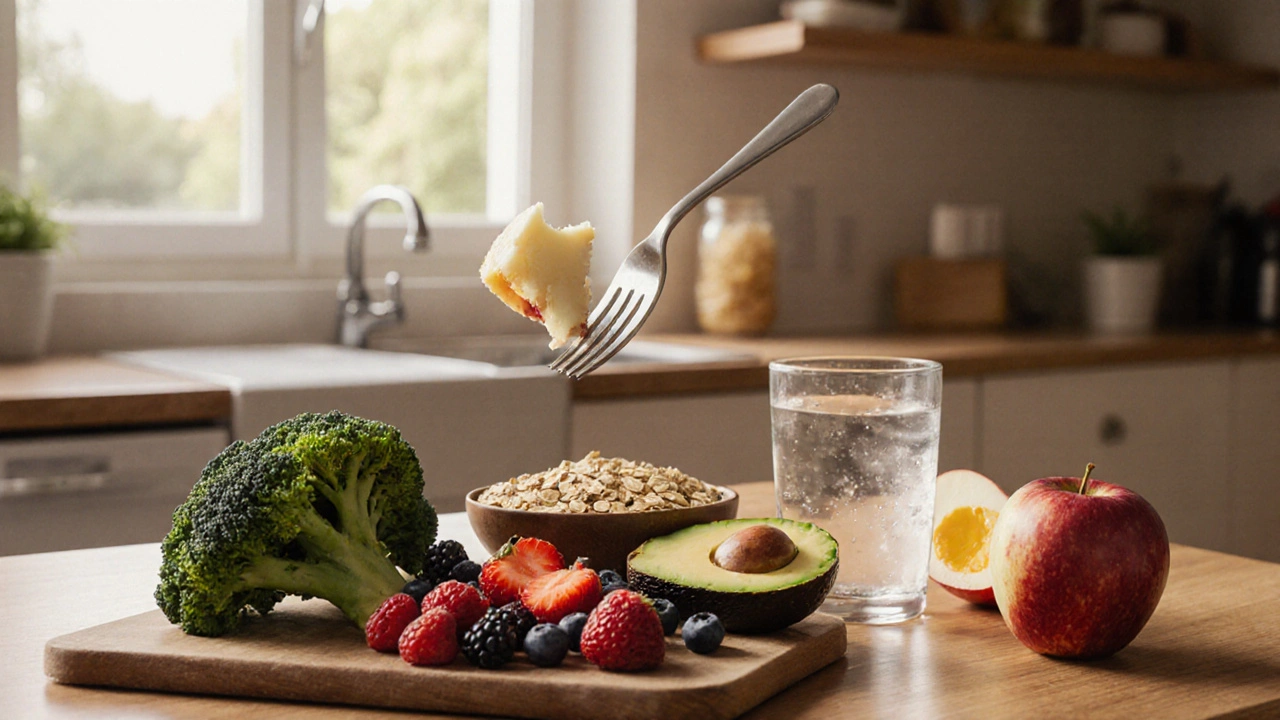Gut Health Symptom Tracker
Track Your Symptoms
Your Symptom History
Key Insights
Based on your entries, you've identified 0 common triggers:
When your stomach feels off, it’s not just discomfort-it’s your whole day unraveling. Bloating after lunch, constant gas, cramps that hit at the worst times, or even just a feeling that food doesn’t sit right: these aren’t normal. They’re signs your gastro health needs attention. And the truth is, most people wait until it’s painful before they do anything. By then, it’s harder to fix. The good news? Excellent gastro health isn’t about expensive supplements or extreme diets. It’s about consistent, simple habits that work with your body, not against it.
What Gastro Health Really Means
Gastro health isn’t just about not having heartburn or constipation. It’s the smooth, quiet operation of your entire digestive tract-from your mouth to your colon. This system breaks down food, absorbs nutrients, eliminates waste, and even communicates with your brain through the vagus nerve. A healthy gut also houses trillions of bacteria-your microbiome-that influence everything from your immune system to your mood. When this system works well, you feel energized, clear-headed, and free from constant digestive noise.
But when it’s out of balance, symptoms pile up: bloating, diarrhea, constipation, acid reflux, food intolerances, even skin issues or brain fog. These aren’t random. They’re signals. And they start with what you eat, how you eat, and how you live.
Eat Real Food, Not Just Less Food
People think fixing gastro health means cutting out carbs or going gluten-free. But the real issue isn’t one food-it’s the quality of everything you’re eating. Ultra-processed foods-packaged snacks, sugary drinks, frozen meals, even ‘healthy’ protein bars-are loaded with additives, emulsifiers, and artificial sweeteners that disrupt your gut lining and feed bad bacteria.
Instead, focus on whole, unprocessed foods:
- Vegetables like broccoli, spinach, carrots, and Brussels sprouts
- Fruits such as apples, berries, bananas, and pears
- Whole grains like oats, brown rice, and quinoa
- Lean proteins: chicken, fish, eggs, beans, lentils
- Healthy fats from olive oil, avocado, nuts, and seeds
Studies show that people who eat at least 30 different plant-based foods a week have far more diverse gut bacteria than those who eat fewer than 10. Diversity = resilience. Your gut thrives on variety, not restriction.
Chew Your Food Like Your Life Depends on It
You’ve probably heard this before, but most people still rush through meals. Chewing isn’t just about breaking food into smaller pieces-it’s the first step in digestion. Saliva contains enzymes that start breaking down starches. If you swallow large chunks, your stomach has to work harder. That leads to bloating, indigestion, and poor nutrient absorption.
Try this: Put your fork down between bites. Aim for 20-30 chews per mouthful. Notice the texture and flavor. This simple habit reduces bloating by up to 40% in people with functional digestive disorders, according to a 2024 study in the Journal of Clinical Gastroenterology. It also helps you feel full faster, so you naturally eat less without counting calories.
Hydrate Smart, Not Just More
Drinking water helps digestion-but timing matters. Chugging a liter of water with your meal dilutes stomach acid, which can slow digestion and cause reflux. Instead, sip water 20-30 minutes before eating. Keep sipping lightly during the meal. Finish with a glass of water an hour after.
Also, avoid sugary drinks and artificial juices. Even ‘natural’ fruit juices spike blood sugar and feed harmful gut bacteria. Herbal teas like ginger, peppermint, or fennel are better choices. Ginger reduces nausea and speeds up stomach emptying. Peppermint relaxes the muscles in your digestive tract, easing cramps and gas.

Move Your Body-But Not Right After Eating
Exercise isn’t just for your heart or muscles. It keeps your gut moving. Regular physical activity improves gut motility, which means food moves through your system at the right pace. That reduces constipation and lowers your risk of diverticulitis.
But don’t go for a run right after lunch. Your body needs to focus on digestion, not running. Wait at least 60-90 minutes after a big meal. Gentle movement like walking after eating is perfect. A 15-minute walk after dinner can cut post-meal bloating by half.
Manage Stress Like Your Gut Depends on It-Because It Does
Your gut and brain are wired together. When you’re stressed, your body releases cortisol and adrenaline. These hormones shut down digestion. That’s why you lose your appetite when anxious-or why panic can trigger diarrhea.
Chronic stress leads to leaky gut, inflammation, and irritable bowel syndrome (IBS). The solution isn’t to eliminate stress-it’s to build resilience. Try:
- Deep breathing for 5 minutes before meals
- Journaling for 10 minutes in the morning or before bed
- Walking in nature-even 20 minutes a few times a week
- Getting 7-8 hours of sleep every night
A 2023 study from Harvard Medical School found that people who practiced daily mindfulness for eight weeks saw a 35% reduction in IBS symptoms. Your gut doesn’t care about your inbox-it cares about your calm.
Probiotics and Prebiotics: Use Them Right
Probiotics are live bacteria found in yogurt, kefir, sauerkraut, kimchi, and kombucha. Prebiotics are the fiber that feeds good bacteria-found in garlic, onions, asparagus, chicory root, and bananas.
Most people take probiotic supplements hoping for a quick fix. But unless your gut is severely imbalanced (after antibiotics, for example), supplements aren’t necessary. Real food works better. A daily serving of fermented foods gives you more diverse strains than any pill.
And don’t overdo prebiotics. Too much too fast can cause gas and bloating. Start with one serving of prebiotic-rich food a day and slowly increase. Your gut will thank you.

Watch Out for These Hidden Triggers
Some foods aren’t bad for everyone-but they’re bad for you. Common culprits:
- Artificial sweeteners like sucralose and aspartame-they change gut bacteria and increase glucose intolerance
- Carbonated drinks-they add air to your gut, causing bloating
- High-fat fried foods-they slow digestion and trigger reflux
- Large portions of dairy-if you’re lactose intolerant, even small amounts add up
- Spicy foods-can irritate the stomach lining in sensitive people
Keep a simple food and symptom journal for two weeks. Write down what you eat and how you feel 2-4 hours after. Look for patterns. Maybe you’re fine with yogurt but bloated after pizza. That’s your clue.
When to See a Doctor
Some symptoms are red flags. Don’t ignore them:
- Unexplained weight loss
- Bloody or black stools
- Severe, persistent pain
- Difficulty swallowing
- Symptoms that wake you up at night
These could signal something serious like Crohn’s disease, ulcerative colitis, or even cancer. See a gastroenterologist if any of these show up. Don’t wait. Early detection saves lives.
Building a Routine That Lasts
There’s no magic bullet. Gastro health isn’t a sprint-it’s a lifestyle. Start with one change. Maybe it’s chewing slower. Or drinking water before meals. Or swapping one processed snack for an apple.
Once that feels easy, add another. In three months, you won’t recognize how you felt before. You’ll sleep better. You’ll have more energy. You’ll stop checking the clock before you leave the house.
Your gut is the quiet hero of your body. Treat it like one.
Can stress really cause stomach problems?
Yes. Stress triggers the release of hormones like cortisol, which slow digestion and increase stomach acid. This can lead to heartburn, bloating, cramps, and even worsen conditions like IBS. The gut-brain connection is real-when your mind is stressed, your gut reacts. Managing stress through breathing, sleep, or walking can dramatically improve digestive symptoms.
Are probiotic supplements necessary for good gut health?
Not for most people. If you eat a variety of fermented foods like yogurt, kefir, sauerkraut, and kimchi, you’re already getting plenty of good bacteria. Supplements can help after antibiotics or during acute digestive flare-ups, but they’re not a daily requirement. Food-based sources offer more diverse strains and are better absorbed.
Why do I feel bloated after eating vegetables?
Vegetables are high in fiber and certain carbs that gut bacteria ferment, producing gas. This is normal and usually improves over time. Start with cooked vegetables instead of raw, chew them well, and increase your intake slowly. If bloating persists with specific veggies like broccoli or cabbage, try rotating them and see if your body adjusts.
How long does it take to improve gastro health?
You might notice less bloating or better digestion in 2-4 weeks with consistent changes. But true gut healing-restoring balance to your microbiome and repairing the gut lining-takes 3 to 6 months. Patience and consistency matter more than quick fixes.
Can alcohol damage my stomach lining?
Yes. Alcohol irritates the stomach lining and increases acid production, which can cause inflammation and gastritis. Even moderate drinking-more than one drink a day for women or two for men-can disrupt gut bacteria and lead to leaky gut over time. Cutting back or taking days off alcohol often brings quick relief.
If you’ve been ignoring your gut because you thought it was just ‘normal’ discomfort, it’s time to change that. Your digestive system isn’t meant to be noisy. It’s meant to work silently, efficiently, and without drama. Start small. Stay consistent. And give your gut the respect it deserves.






